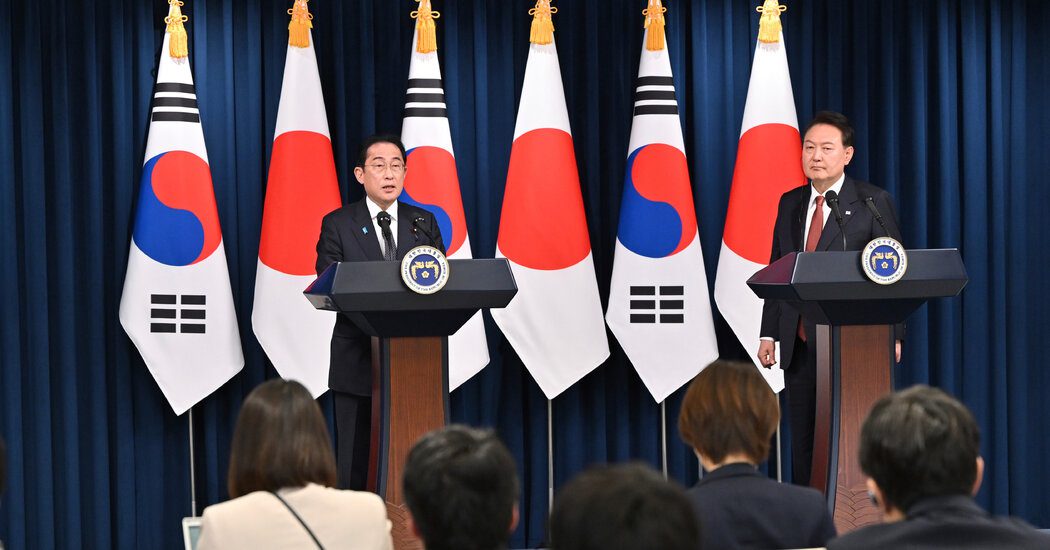Global Courant 2023-05-08 01:26:36
The Japanese leader visits Seoul
Japan’s Prime Minister Fumio Kishida is in South Korea today, meeting with President Yoon Suk Yeol in an effort to foster a young détente. Yesterday, the two leaders in Seoul agreed to continue joint efforts to improve bilateral relations — though Kishida made no apology for Japan’s colonial rule of the Korean peninsula in the early 20th century.
Kishida went no further than to say that Japan was sticking to past statements when some of its predecessors expressed remorse and apology. He said his “heart ached” when he thought about the suffering of the Koreans, but his words fell short of the clear and direct apology many South Koreans, including the head of the main opposition party, had demanded.
Yoon said he would not continue to seek such an apology, despite criticism from some Koreans: “It is not something we can demand unilaterally; it is something that should come naturally from the sincerity of the other side. Instead, Yoon urged his nation to focus on the immediate challenges posed by North Korea and China.
Context: Kishida’s two-day trip follows Yoon’s March visit to Tokyo. It means shuttle diplomacy is back on track after regular exchanges between the countries’ leaders ended in 2011 over historic disagreements.
US prepares for wave of immigration
The US is preparing to lift a pandemic-era health rule that prevented hundreds of thousands of people from entering the country. It is bracing for a throng of people on the border with Mexico — and a flare-up of political tension.
The US expects as many as 13,000 migrants a day from Friday, immediately after the measure expires. That is more than about 6,000 migrants on a normal day. Three Texas cities have declared a state of emergency, and President Biden recently sent 1,500 troops to the border.
More and more people are coming from distant countries experiencing economic distress or political unrest, such as Venezuela, China, India and Russia. Within the US, the debate over the broken immigration system is still polarized and overheated, posing a serious political risk as the 2024 campaign gets under way.
Context: The order, known as Title 42, enabled the US government to quickly return citizens of several countries to Mexico.
Asylum: A harsh new rule will take effect on Thursday that disqualifies asylum seekers who have not first sought protection elsewhere.
The debate heated up in February when the Globe and Mail newspaper said classified intelligence reports showed China was trying to rig the Canadian election — including in Vancouver. The reports have not been made public, but would conclude that China was trying to secure Prime Minister Justin Trudeau’s Liberal Party victory in the two most recent federal elections and support for candidates of Chinese descent.
China’s former Consul General in Vancouver tried to groom local Chinese-Canadian politicians, according to reports. Sim’s rival is also calling for an investigation into China’s meddling. Sim dismisses claims that Beijing interfered, instead pointing to his tireless campaign and more attractive policies to explain his landslide victory. “If I were a white man, we wouldn’t be having this conversation,” he said.
Analysis: Canada’s former ambassador to China said Canada was seen by Beijing as a target of influence, in part because Beijing sought to use Canada as leverage to pressure the US to soften its opposition to China.
THE LAST NEWS
Around the world
Sherpa guides are leaving the industry to take hikers up Mount Everest and encourage their children to pursue other careers. There are many reasons for the shift: the job is dangerous, the pay is modest and there is little job security.
“I don’t see a future,” Kami Rita Sherpa, a renowned guide pictured above in blue, told his son.
SPOTLIGHT ON AFRICA
On the run again
The war in Sudan, sparked by two feuding generals, has driven more than 100,000 civilians across the border, and aid workers say as many as 800,000 could be forced to flee in the coming months.
Thousands have fled to Egypt and Saudi Arabia and to relatively safer cities in Sudan. For many on the run, flight is not new. “The really, really sad thing about this is that this isn’t the first time these people have fled,” said Charlotte Hallqvist, a spokeswoman for the United Nations High Commissioner for Refugees for South Sudan.
Sudan had more than a million refugees from countries already torn by civil war, such as Syria and South Sudan. It also had millions of internally displaced people fleeing conflicts in Sudan. As the new fighting enters a fourth week, these people are on the move again, facing a new wave of violence and trauma.
In Sudan’s Darfur region, more than three million people were displaced from their homes during civil war in the early 2000s. Just weeks before the latest violence erupted, local authorities had begun planning the gradual voluntary return of refugee communities in Darfur, said Toby Harward, chief situation coordinator in Darfur for UNHCR. Instead, more are now fleeing the region. — Lynsey Chutel, a Times writer in Johannesburg








